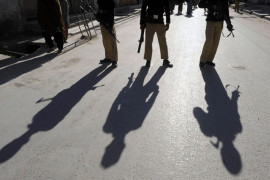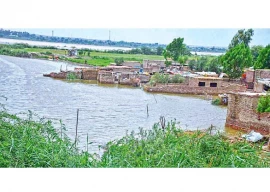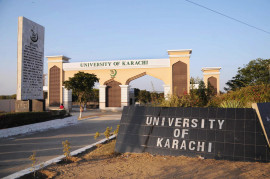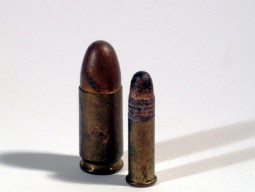
“The only time I got to watch TV was here, I didn’t want to leave,” he continues.
Saeed’s father shifts in his chair; he has a story to tell. His only son has been unwell since he was born. Saeed’s father used to own a fruit cart in Jacobabad. None of the local doctors could diagnose his condition and relatives advised him to move to Karachi for better treatment. At Civil Hospital they diagnosed him with a congenital heart defect — simply put — a hole in the heart, and renal failure — a medical condition in which the kidneys fail to adequately filter toxins and waste products from the blood streams.
Saeed was immediately admitted to the OPD at the Sindh Institute of Urology and Transplant (SIUT) and was provided full treatment without any charge.
Having had a kidney transplant and heart surgery three years ago at the age of 12, Saeed is now a healthy young boy, finally able to take part in life; be it an evening walk in the park or running till breathless at Sea View.
For his father, Saeed’s progress has been nothing short of a miracle. “They gave my son a chance at a normal life,” he says, “SIUT is not a hospital; it’s a blessing for people like us, what do you think my options would be otherwise?”
Starting as an eight-bed unit in 1971, SIUT is now a 500-bed facility. It is the largest health organisation in Pakistan, providing free comprehensive services in the areas of kidney disease, transplantation, liver disease and related cancers.
The motto of Dr Adibul Hasan Rizvi, the founder and director of the institution, is “We cannot let them die just because they cannot afford to live.”
With over 2,900 transplants, SIUT is the world’s largest living-related donor kidney transplant centre. It allows only blood relatives to donate kidney to the patients, to ensure maximum matches and minimum chances of rejection.
This institution is attention-worthy not only because it continues to provide charitable health services where they are needed most, but also because SIUT is aiming to promulgate a cultured health-conscious lifestyle amongst the most deprived and least educated elements of our country.
Tasneem Niaz enters the sitting area with an aura of energy, smiling vibrantly. Fifteen years ago she had to have an abortion due to kidney failure and received a transplant at SIUT. Today, she is a mother of two, mother and children all in good health.
“I cannot forget the time I was hooked up to to the dialysis machine four hours a day, for three to four days a week,” Tasneem says.
“It’s like being the living dead. You can’t move, can’t sit, can’t stand. Even breathing hurts. Hours of just sitting and waiting for the life-support can be so depressing but here at SIUT we were given lessons on knitting, pottery and flower decorations so that our time was spent constructively, not in morbid reflection. Today, I continue to make flower arrangements at home. They’re promoting a lifestyle, not just fixing people. This place is a sanctuary.
“Very few people are grateful for what they have. When my son took his first steps, I walked with him, today I played with my daughter in the park, and every time I enjoy a tiny pleasure, which might seem insignificant, I send my blessings to SIUT.”
In Pakistan, an estimated 50,000 people die from organ failure every year. Today, no more than 1,000 kidney transplants are performed each year – a small number considering the 15,000 who need a transplant.
Last year alone, SIUT catered to 690,000 patients from all over Pakistan at an annual expense rising above Rs1.3 billion (US $15.6 million). It caters to over 80 per cent of the population from the country’s rural areas where medical facilities of any sort are a luxury considering the basic living conditions.
SIUT has grown beyond a hospital and has taken a life of its own as a social institution. Not only are the patients treated here but they are connected to the institute throughout the course of their lives. SIUT provides all its patients with a free lifetime’s supply of post-transplant medication. One of SIUT’s earliest transplant patients returned to his village and would come to Karachi every three months to collect his medicines. The post- surgical and rehabilitation team started to notice a stark difference in the old man’s appearance every six months; during the summers he would appear healthy, but the other half of the year, it seemed like he would lose significant amount of weight.
Upon investigation it was discovered that he was a poor farmer and his lands would not provide him with a crop in winters and subsequently, he would starve half the year. SIUT continues to send him half a year’s financial subsistence to date. This level of commitment is unparalleled in the medical community.
It is a commitment that can be seen in every member of staff. After speaking to a former patient, who had been discharged 21 years ago, I asked a ward boy to dig up his details for me. To my astonishment, the staffer, who receives around 80 patients a day, responds with total confidence, “Sahab, it is file number 52.”
In recent years we have witnessed very little to make us feel proud about our nation. Here at SIUT there is plenty to see.
Published in The Express Tribune, September 5th, 2010.
1731914690-0/trump-(26)1731914690-0-405x300.webp)
















COMMENTS (4)
Comments are moderated and generally will be posted if they are on-topic and not abusive.
For more information, please see our Comments FAQ